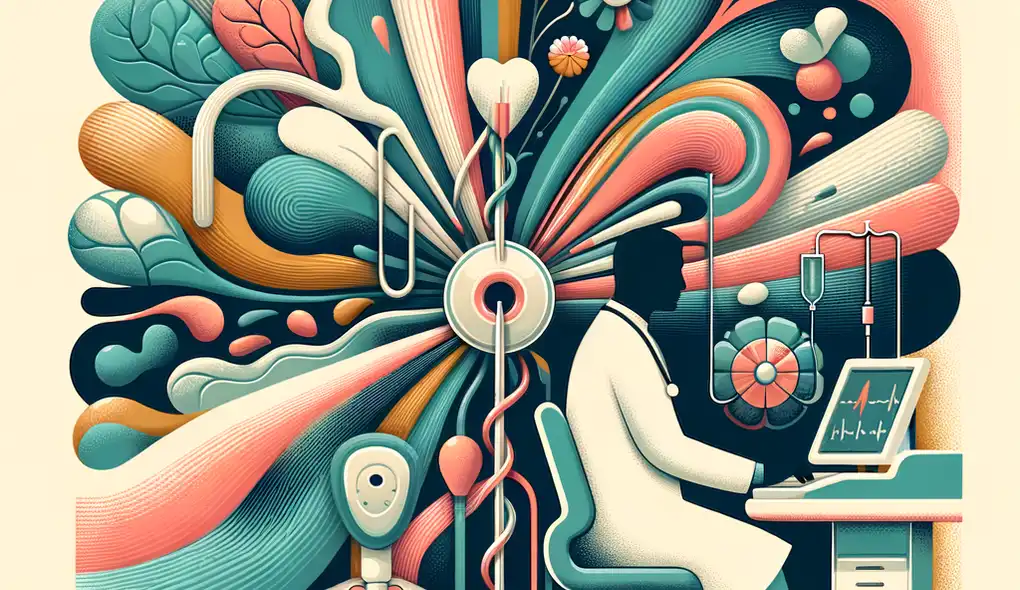Can you provide an example of a time when you had to collaborate with a multidisciplinary team for patient care?
Interventional Radiologist Interview Questions
Sample answer to the question
Last year, I had the opportunity to collaborate with a multidisciplinary team for a complex patient case. The patient was presenting with a tumor in the liver that required both surgical intervention and interventional radiology procedures. As the interventional radiologist on the team, my role was to perform a pre-operative embolization procedure to reduce blood flow to the tumor and minimize bleeding during surgery. I worked closely with the surgeon, oncologist, anesthesiologist, and radiology technicians to plan and coordinate the procedures. We had regular meetings to discuss the patient's condition, review imaging studies, and discuss the treatment plan. Throughout the collaboration, clear communication and effective teamwork were crucial. We successfully coordinated the embolization procedure with the surgical intervention, and the patient had a successful outcome. This experience highlighted the importance of multidisciplinary collaboration in providing comprehensive patient care.
A more solid answer
Last year, I had the opportunity to collaborate with a multidisciplinary team for a complex patient case involving liver tumor. The patient required both surgical intervention and interventional radiology procedures. As the interventional radiologist on the team, I played a crucial role in performing a pre-operative embolization procedure to reduce blood flow to the tumor and minimize bleeding during surgery. I worked closely with the surgeon, oncologist, anesthesiologist, and radiology technicians to plan and coordinate the procedures. This collaboration involved regular meetings to discuss the patient's condition, review imaging studies, and discuss the treatment plan. One of the challenges we faced was ensuring seamless coordination between the embolization procedure and the surgical intervention. To overcome this, we developed a detailed timeline, established clear communication channels, and held regular check-ins to monitor progress. The collaboration was highly successful, and the patient had a favorable outcome. This experience reinforced the importance of multidisciplinary teamwork in providing comprehensive patient care and highlighted the value of clear communication, effective coordination, and the collective expertise of the team.
Why this is a more solid answer:
The solid answer builds upon the basic answer by providing additional insights into the candidate's personal contributions, challenges faced, and the overall impact of the collaboration. It emphasizes the importance of clear communication, effective coordination, and the collective expertise of the team. However, the answer could still be improved by discussing the candidate's specific communication strategies and the long-term impact of the collaboration on patient care.
An exceptional answer
Last year, I had the opportunity to collaborate with a highly skilled and diverse multidisciplinary team to provide comprehensive patient care for a complex case involving a liver tumor. As the interventional radiologist on the team, I played a central role in performing a pre-operative embolization procedure to reduce blood flow to the tumor and minimize bleeding during surgery. The collaboration involved close coordination with the surgeon, oncologist, anesthesiologist, and radiology technicians. To ensure effective communication, I implemented a daily huddle where we discussed the patient's condition, reviewed imaging studies, and adjusted the treatment plan as necessary. I also utilized a secure messaging platform for real-time communication and shared updates on the patient's progress. One of the major challenges we faced was the tight timeline for the procedures. To overcome this, I worked closely with the team to optimize scheduling, streamline processes, and efficiently allocate resources. The collaboration resulted in a seamless integration of the embolization procedure with the surgical intervention, reducing the patient's overall treatment time and minimizing complications. This experience showcased the power of multidisciplinary teamwork and highlighted the long-term impact it can have on patient outcomes. By leveraging the collective expertise of the team, we were able to provide personalized and tailored care that ultimately led to the patient's successful recovery.
Why this is an exceptional answer:
The exceptional answer further enhances the solid answer by providing additional details about the candidate's specific communication strategies, utilization of technology, and the long-term impact of the collaboration on patient care. It highlights the candidate's proactive approach to optimize scheduling, streamline processes, and efficiently allocate resources. The answer also emphasizes the personalized and tailored care provided by leveraging the collective expertise of the team. Overall, the exceptional answer demonstrates a deep understanding of the importance of multidisciplinary collaboration and its positive impact on patient outcomes.
How to prepare for this question
- Reflect on past experiences where you collaborated with a multidisciplinary team for patient care. Think about the specific roles and responsibilities of each team member and how you contributed to the overall collaboration.
- Consider any challenges or obstacles you encountered during the collaboration and how you overcame them. Reflect on the strategies you used to ensure effective communication and coordination.
- Highlight the impact of the collaboration on patient care, emphasizing the positive outcomes and the value of multidisciplinary teamwork.
- Familiarize yourself with the interventional radiology procedures mentioned in the job description. Be prepared to discuss your experience and proficiency in performing these procedures.
- Research the latest advancements in interventional radiology and stay updated with the current trends and technologies in the field. This will demonstrate your commitment to continued education and professional development.
What interviewers are evaluating
- Collaboration
- Patient Care
- Multidisciplinary Teamwork
Related Interview Questions
More questions for Interventional Radiologist interviews